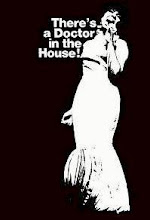However, throughout her career she never made it into the first line of performers. For one thing, because due to her feisty appearance she was for years the laughing stock of the press. Sadly enough, it's hard to find any news item of the epoch that doesn't refer to her weight:
The laughs that singers Bo Diddley and Big Maybelle Smith are getting in ex-deejay Allan Freed's Apollo Theatre show in Harlem when they finish their duet. Instead of the 150-pound Diddley picking up the 275-pound Big Maybelle in his arms, she carries him off stage on her shoulders, like a sack of pota- toes. (JET magazine, Feb 18, 1960)And I posted another item, likewise from JET, at the end. You can see Big Maybelle stepping in New York, and the photograph is accompanied by a caption that again refers, indirectly but quite clearly, to Big Maybelle's weight: »Doing the Twist to end all Twists.« Musically speaking, Big Maybelle's appearance was matched by appro- priate songs like »Candy« (with such memorable lines as »candy's always handy when I need sympathy«) which was her first recording for Savoy in 1956 (Savoy 1195A) and proved a solid hit.
How the management at Chicago's Regal Theater worried about the beams holding up the stage when 300-pound, hip-shaking Tiny Topsy and the 460-pound blues shouter Big Maybelle appeared on the same bill and joined some 30 other top performers in a rousing grand finale that actually had the big movie house rocking. (JET magazine, Sept 7, 1961)
 |
| Billboard ad Nov. 3, 1962 |
 |
| Brunswick LP # 754107 (1962) |
There are some rare songs on the Brunswick LP that show that Big Maybelle could still cope with the predicament of not being allowed to be herself. To my taste, the best song on the LP is her version of »How Deep Is The Ocean«. Perhaps it is her deep and desperate-sounding voice that render this tune special, and from the very beginning, with the strings shivering deeply in menac- ing minor, Big Maybelle really gets into it. When her voice soars up you can still hear the belter she actually was but it doesn't sound out of place here.
Big Maybelle: »Candy« / »How Deep Is The Ocean« from the Brunswick LP # 754107 (1962):
* * *
 |
| From JET, May 4, 1961, page 37. |
*Note: The spurious album Epic »EG 7071« from 1954, widely referred to, did not exist in its time. I never saw a copy of it nor even a photo of the presumed cover.















No comments:
Post a Comment